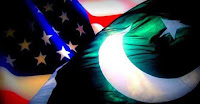Former CIA officer John Kiriakou discusses these reports and
concludes that the incidents are false-flag operations orchestrated by Western
sponsors of the Ukrainian regime. Kiriakou says it is the CIA that has a
notorious track record of engaging in dirty tricks when its operations are
going badly.
And, to be sure, the NATO proxy war in Ukraine against
Russia is going very badly indeed. Russia has the military upper hand, while
the NATO-backed Kiev regime is facing collapse.
A defeat for Washington and its NATO partners in Ukraine
would be a political disaster for the Western powers. Hence they are getting
desperate.
This explains the upsurge in Western media reports that
Russia has started to use chemical weapons and that Russia is endangering the
nuclear power plant at Zaporozhye, Europe’s largest civilian nuclear power
station.
The latter insinuation by the Western media is particularly
absurd. Russia took control of the Zaporozhye Nuclear Power Plant in March
2022.
It
should be obvious that the NATO-backed regime is the perpetrator of nuclear
terrorism yet the Western governments, media and the UN’s International Atomic
Energy Agency all adopt a shameful ambiguity about the perpetrator. The Western
sponsors are covering up for a nuclear terrorist regime in Kiev because the
Western governments are fully complicit in the terrorism.
John Kiriakou points out that the same playbook was used in
Syria. When the Syrian Arab Army was gaining the military upper hand against
NATO-sponsored jihadi mercenaries trying to overthrow the Syrian government,
the Western media then reported alleged chemical weapons attacks by the Syrian
army.
That
resulted in the United States, Britain, and France launching air strikes
against Syria. It turned out that the chemical weapon attacks were false flags
conducted by the CIA and MI6-trained proxies.
Now that the NATO powers are losing the war in Ukraine
against Russia – a war that they have invested in on an unprecedented colossal
scale – the reaction is to repeat the false flag playbook as a desperate way to
create a chemical or radiological disaster to justify an escalation of the war,
perhaps by direct NATO intervention.
It does not matter to the Western warmongering elite that
the safety of the planet is being recklessly jeopardized.
The same Western warmongering ruling establishments have
fomented world wars and countless other wars costing tens of millions of lives.
Their criminal recklessness knows no bounds.
John Kiriakou was jailed by the US government for two years
after he blew the whistle on the CIA’s torture program. He now works as an
independent journalist and commentator and has gained worldwide respect for his
integrity and truth-telling.







